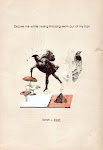I'd like to compare Never Let Me Go to a martini. Unlike red wine, where you may find nuances of fruit, cigar smoke, a chewy bosom, violet underpants, a clove or cinnamon finish, etc etc etc, this book one flavor throughout - dry and detached, but not without its own wallop.
And instead of an olive, there's a kidney or lung floating around in the martini glass. I know this is unappetizing, but if you've read the book, you know what I mean.
I love Ishiguro - his writing is clean, his technique is fabulous, and I'm obsessed with his obsession - putting the past together in a way that makes sense. Unfortunately I knew something of the plot before I started, which diminished my enjoyment. I would have loved to be surprised. Perhaps that contributed to the feeling that the book was written in slow motion.
Without going too much into the plot, since I'd recommend reading this and wouldn't want anyone to suffer my fate of foreknowledge, the one thing that's pestering me is why is there not rebel among the "special" group of people under the microscope here. Some readers say the characters are so brainwashed there's no chance of protest, but I don't see that. And if there's no rebellion, then maybe the "soul" that's under discussion in this book is indeed absent. I don't think so, which is why I find this aspect so hard to buy.
Then again, I couldn't help but identify with the characters here in a no-way-out sense, in that there's nothing you can do to thwart mortality even through "true love" or creative work.
This was the fourth book in the Booker Challenge for me. Two to go.
And since I can't find Tom Lehrer's song "Bright College Days," from which my heading comes today, I offer instead "The Elements."
Subscribe to:
Post Comments (Atom)




No comments:
Post a Comment